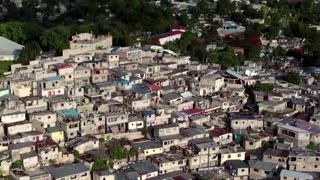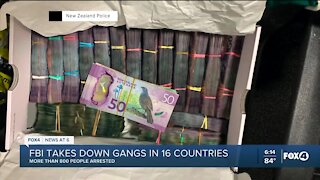Premium Only Content

Is Organized Crime Tied to Haiti President’s Assassination?
A convicted cocaine trafficker is among the suspects that authorities in Haiti are pursuing in connection to the middle-of-the-night murder of former President Jovenel Moïse, raising questions about whether organized crime had any role in the high-profile assault.
Rodolphe Jaar, a former drug smuggler and US Drug Enforcement Administration (DEA) informant, is wanted by the national police for murder, attempted murder and armed robbery alongside former Haitian government official Joseph Félix Badio and well-known opposition politician John Joël Joseph, Le Nouvelliste reported.
According to local media reports, National Police Chief Léon Charles also announced the arrest of former rebel group leader Gilbert Dragon and businessman and US resident Christian Emmanuel Sanon for their suspected involvement in Moïse’s assassination. Authorities are still looking for several other fugitives presumed to be connected to the crime, including a Venezuelan businessman who owns a security company allegedly linked to the murder.
This comes just one week after an armed commando of foreign mercenaries allegedly shot the president 12 times at his home in Port-au-Prince early July 7, killing him and wounding First Lady Martine Moïse. At least 26 former Colombian soldiers and two other Haitian-Americans are suspected of participating in the attack.
However, some of the Colombian soldiers - 21 of whom have been killed or arrested - told The New York Times that they had been recruited to “fight gangs, improve security, protect dignitaries and democracy and help rebuild a long-suffering country,” not kill the sitting president. Authorities in Haiti are also looking into members of the former president’s security team, none of whom were injured in the killing.
SEE ALSO: Who Was Behind the Killing of Haiti's President?
In Jaar’s case, the Dominican Republic’s National Drug Control Agency (Dirección Nacional de Control de Drogas - DNCD) arrested him in mid-2013 in the capital city of Santo Domingo, where he had reportedly been living in a luxury hotel. US prosecutors indicted Jaar, who also used the alias “Whiskey,” earlier that year on charges he conspired to smuggle cocaine into the United States.
Court records show that Jaar later pleaded guilty to those charges and was sentenced to 46 months in prison. At his sentencing hearing in 2015, his lawyer called the case against him “slightly unusual” because he was “cooperating with the DEA at the time of the offense, making them aware of a drug shipment that was coming into Haiti, a 425-kilogram load of narcotics. And he was in contact with agents that were on the ground.”
In other court filings related to his plea agreement, Jaar admitted to helping smuggle cocaine from Colombia and Venezuela, through Haiti and on to the United States between early 2010 and April 2013. Jaar “was present at negotiations concerning the shipment of the cocaine from Colombia and/or Venezuela to Haiti and assisted in these negotiations. [He] was in charge of arranging security so that the cocaine load could land in Haiti at a clandestine airstrip,” according to court documents.
InSight Crime Analysis
There is still little clarity on who actually fired the shots that killed the former president and why. But dividing the political from the criminal is extremely murky in Haiti. Armed gangs have long brokered mutually beneficial deals with politicians, who secure political support in exchange for turning a blind eye to criminal activity.
And while the systematic sacking of state resources through government corruption has often acted as one of Haiti’s main criminal economies, the country has also been exploited by international drug smugglers. It has for years acted as a key stopover point for South American cocaine shipments, despite not grabbing as much attention as its neighbors in the Dominican Republic.
Arguably one of the most prominent cocaine traffickers to emerge from Haiti in recent years was Beaudouin "Jacques" Ketant. He was eventually convicted in the United States for operating a smuggling ring that bribed local police and other government officials to move hundreds of tons of cocaine from Colombia’s Medellín and Norte del Valle cartels through Haiti and into the United States.
Ketant claimed to have paid millions in bribes to former President Jean-Bertrand Aristide. “He turned the country into a narco-state,” Ketant infamously charged in a Miami courtroom in 2004. Aristide denied those claims and was never charged but was ousted and forced into exile after a second US-backed coup d'état in 2004. He returned to Haiti in 2011 and is now battling COVID-19 in Cuba. In 2015, Ketant was released from prison and deported back home.
-
 7:24
7:24
NEWSMAX
3 years ago2 Americans Arrested in Haiti Assassination
24.2K32 -
 1:34
1:34
Reuters
3 years agoEx-DEA informant linked to Haiti assassination
3.5K20 -
 1:12
1:12
Reuters
3 years agoPope urges fight against organized crime
29116 -
 0:06
0:06
skarlettogd
3 years ago $0.01 earnedOrganized Crime
139 -
 0:33
0:33
WFTX
3 years agoGlobal sting: FBI-run messaging app tricks organized crime
26 -
 LIVE
LIVE
Graham Allen
1 hour agoElon/VivekAppointed To “DOGE”Pete Hegseth Is The New SECDEF!The Elites Are LOSING THEIR MINDS!!😂😂
7,109 watching -
 LIVE
LIVE
Matt Kohrs
10 hours agoElon's DOGE, Breaking Inflation News & Live Trading || The MK Show
770 watching -
 LIVE
LIVE
BonginoReport
2 hours agoMerchants of Death Panic Over Trump's New Nominee (Ep.84) - 11/13/24
11,613 watching -
 LIVE
LIVE
Vigilant News Network
14 hours agoFormer Money Manager Issues Dire Economic Warning | The Daily Dose
2,015 watching -
 LIVE
LIVE
Jeff Ahern
45 minutes agoNever Woke Wednesday with Jeff Ahern (6am Pacific)
299 watching